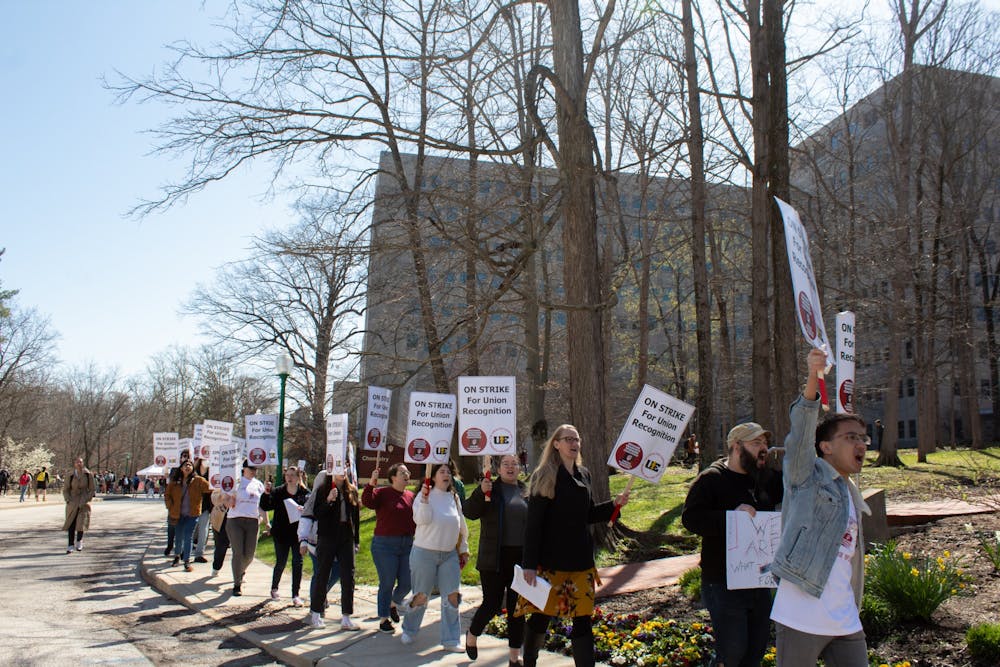Two weeks away from the deadline for grades, IU faculty gathered April 26 to consider a potential vote of no confidence for Provost Rahul Shrivastav in response to the administration’s response to the graduate worker strike.
During the town hall, faculty discussed the possibilities of recognizing the union, extending the deadline for grades and changing current policy to assert the provost does not have the authority to fire graduate workers, in addition to the discussion of a potential vote of no confidence in Shrivastav.
Benjamin Robinson, president of the American Association of University Professors at IU, called the town hall alongside representatives from the Graduate Faculty Council. Robinson said faculty members felt disrespected and didn’t think the administration was acting democratically.
William Winecoff, Director of Graduate Studies for the department of Political Science, proposed a special meeting of the Bloomington Faculty Council to discuss these issues. By the time the town hall ended, Winecoff gathered more than 50 petition signatures, which will require the Bloomington Faculty Council to meet, according to its constitution.
Winecoff said the petition was approved by the faculty council, which is still discussing logistics and an official agenda.
This meeting would mark the first special faculty council meeting called to discuss a vote of no confidence at IU since 2005, which ultimately caused then-President of IU Adam Herbert to resign.
Winecoff said a vote of no confidence from faculty, in addition to the ongoing support from IU Student Government and the Graduate and Professional Student Government’s no confidence vote for Shrivastav would send a strong message to the administration.
“It's not clear to me what kind of credibility they could possibly have on campus at that point,” Winecoff said.
IU spokesperson Chuck Carney declined to comment on the potential vote of no confidence.
Winecoff said the provost has spoken twice about being prepared to fire graduate workers for striking. He said the provost called it a “worst-case” scenario, which would result in the dismissal of more than 1,000 graduate workers.
“We’re really headed to a catastrophe and the administration has shown zero flexibility at any stage in this process so far,” Winecoff said.
Winecoff said the administration has asked departments to disclose lists of graduate workers participating in the strike, but he refuses to provide lists to the administration.
Winecoff said even a few firings could harm IU’s R1 status, which indicates the school has “very high research activity” according to the Carnegie Commission on Higher Education’s classification system.
The designation is determined by the number of doctoral degrees and research expenditures. Losing this status would lower IU’s prestige and jeopardize its ability to receive grants, Winecoff said.
Although the situation is contentious, Winecoff said the graduate workers deserve to be treated as professionals.
“They’ve been planning this for years,” Winecoff said. “The provost has been here for two months. Don’t underestimate them.”
Cole Nelson, a Ph.D. student in the Media School and a union representative for the Indiana Graduate Workers Coalition-United Electrical Workers, said the consequences of firings would be severe.
“If the university were to take these intensively punitive actions against graduate workers, I think it would only further backfire for the administration,” Nelson said.
Nelson said graduate workers are seeking union recognition to advocate for a better educational experience.
“For us, it is crucial that graduate workers, faculty and undergraduate students are all primary participants in crafting the vision of what higher education can be at IU,” Nelson said. “The way things currently stand, that is not the case.”
Robinson said he does not want to be the administration’s “hammer” by aiding in potential firings.
“They’re asking us to compromise our ethics,” Robinson said.
Firing graduate students, Robinson said, would make IU impossible to govern.
“Who has confidence in someone that’s firing the heart and soul of this enterprise with neither due process nor adequate cause?” Robinson asked.




